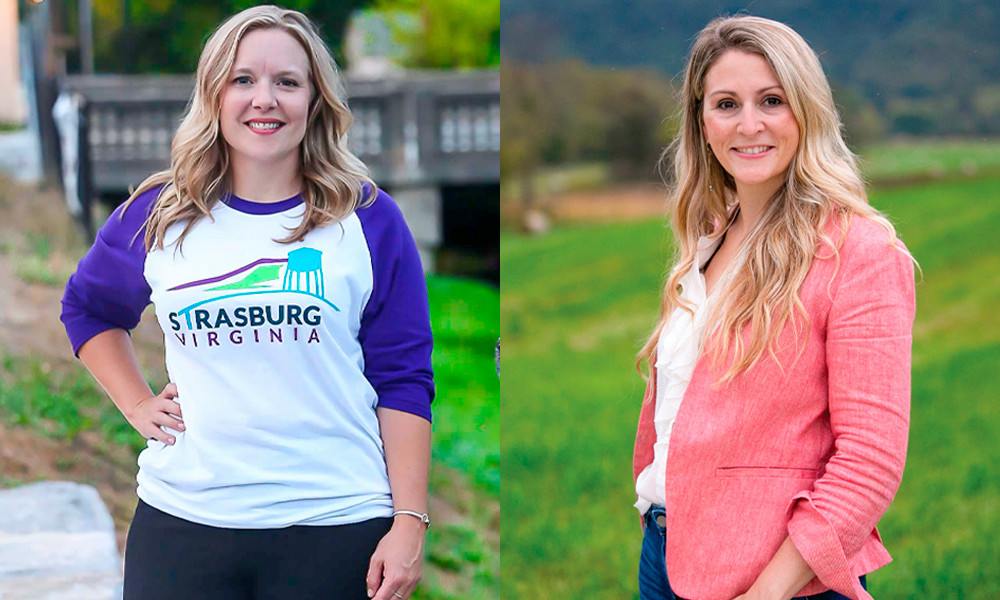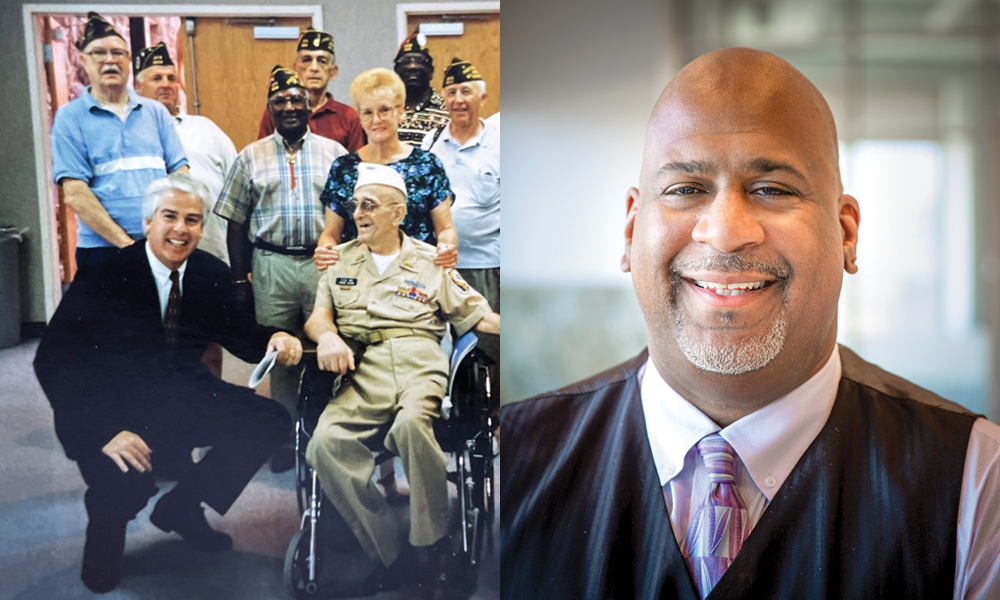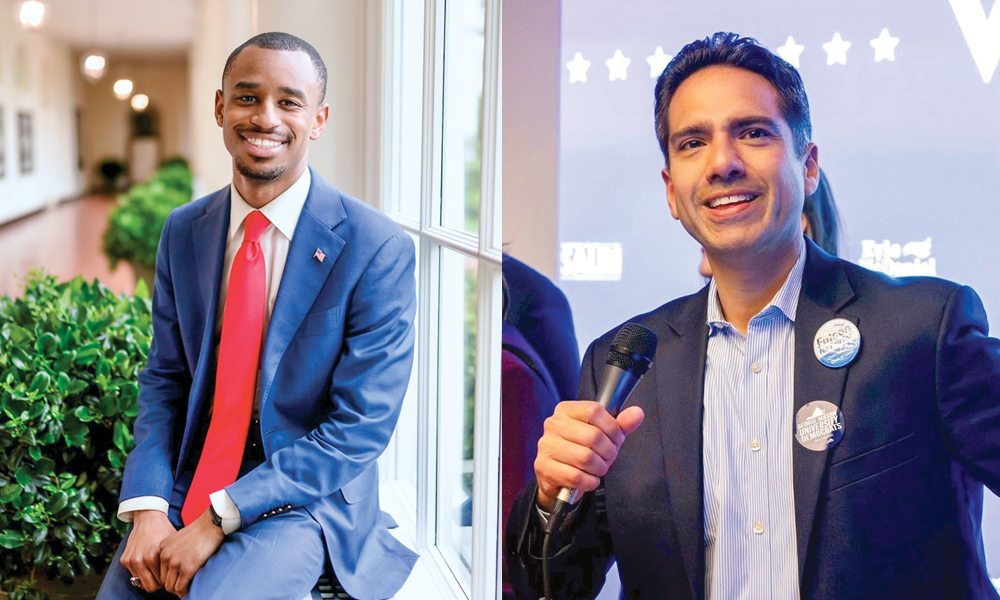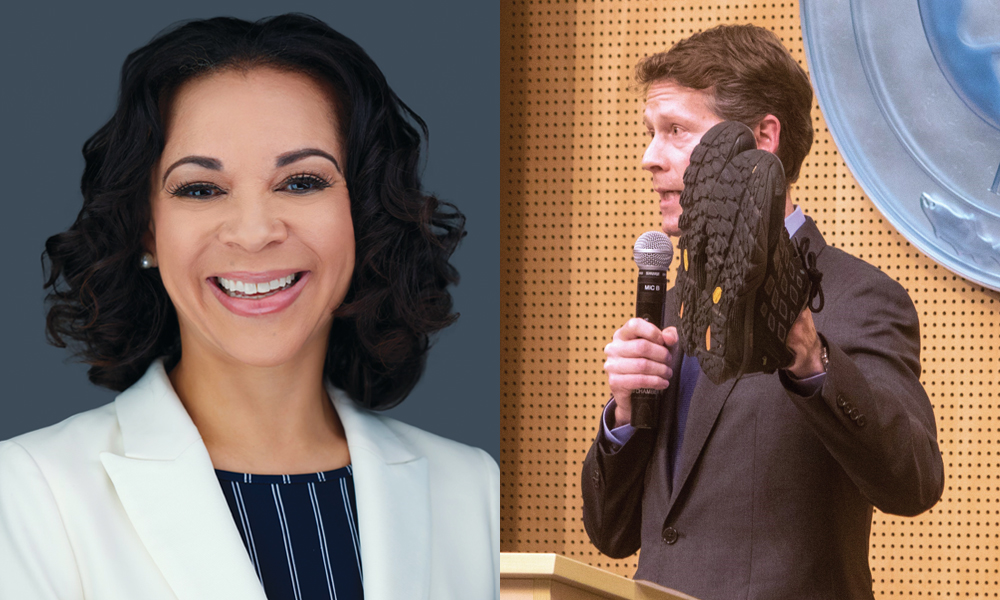Keeping the wheels of government turning
Nation and World
SUMMARY: Dukes have long served as elected officials, appointees and staff at all levels of government. We asked a group of JMU graduates spanning four decades of government service about their work (past and present), some of the challenges they face, how JMU prepared them for their careers and how to ensure the voices of the people they represent are heard.
Brandy Hawkins Boies (’08M), mayor of Strasburg, VA
“My entire life, I had heard that every vote counts during elections, but it wasn’t until I was moved to speak up about our county’s K-12 needs that I truly understood. We saw firsthand how every voice and vote counts, which inspired me to serve.
“The decisions of elected officials do not always make everyone happy, and there are limits to what elected officials can or cannot do. … Citizens’ voices and opinions affect decisions, even if the impact is not immediately visible.
“The role of the mayor is to lead the council and run efficient and effective meetings. I serve as the voice of the citizens, so listening, being present in the public and being accessible are main roles.
“My council and I all hold full-time jobs outside of serving in our elected positions. We are not wealthy; we are simply serving the town we love for the betterment of its future and citizens.
“Anyone can run for office and be elected, which is exciting and terrifying. We must know who is representing us at all levels of government and what they stand for. … It has to be about their ethics, morals and values. Are they good humans? Are they great leaders? We need more of both.
Elizabeth Cooper (’08), Commonwealth’s attorney in Shenandoah County, VA
“I became involved in public service at the onset of my legal career by working as a summer intern for the Shenandoah County Commonwealth’s Attorney — the same office I was recently elected to as Commonwealth’s attorney. … My parents were also Dukes who focused their work on others’ needs and used their strengths and skill sets to serve others.
“The most rewarding part of my job, without question, is the connections I make with others through my work. Whether I have been able to bring closure into the life of a victim by securing a conviction in a case or witness a defendant break their drug habit by maintaining sobriety for a year, I always look forward to the connections made by bringing about justice in our community. Justice looks different in every situation, and when it occurs, a connection is often made. Connections create healing, which is imperative for true justice to occur, and I find being a part of that is the most rewarding part of my job.
“I was elected to a position that many would consider to be at the ‘top’ of a career. I do not have all the answers, and some days, very few. … I can easily say I learn something new each day, and I love it!
“There is a tremendous need for public service in Virginia, let alone our country. Much of it goes unseen. … I think most people don’t get involved until they are affected by an event or situation.”

Sean Dalton (’84), former prosecutor for Gloucester County, NJ (2002-17); assistant attorney general for state of New Jersey (2017-18)
“I am the youngest of eight, and public service was a family affair. … My mother and father instilled in us the importance of being involved.
“I first ran for the New Jersey General Assembly when I was 30, but my involvement dates to when I was a teenager helping on political campaigns. My father, Bill Dalton, was mayor of Glassboro, New Jersey, for about 20 years, and my older brother, Dan, was a state senator and ended his career as New Jersey secretary of state. He signed my certificate of election as secretary of state when I was elected to the General Assembly.
“My first government job was as a public defender in Glassboro. … Later as a county prosecutor, I was responsible for the investigation and prosecution of crimes ranging from theft to sexual assault to murder … We successfully prosecuted several ‘cold-case’ homicides — cases that had languished under my predecessors, some as old as 25 years. Families had been waiting years for someone to be held accountable for their loved one’s death.
“In many ways, a career in public service is a natural extension of the JMU philosophy of Being the Change. … In the days ahead, we will need community leaders who are courageous and willing to put aside partisan politics — leaders who recognize there is more that binds us as Americans than our differences. Our strength is our diversity — we all came to this country because of our belief in the American dream.”
David Ellis (’89), county manager, Wake County, NC
“I grew up in Fredericksburg, Virginia, and as a child, I remember watching my dad get on the Greyhound bus every morning and ride to his federal government job in Washington, D.C. He worked for the National Labor Relations Board for almost 40 years. He was also a minister. The Rev. Lawrence A. Davies — Fredericksburg’s first Black mayor — would come over to our house and talk for hours with my dad about ways to make the city better for everyone. I would eavesdrop on their conversations. Those chats are what inspired me to pursue a career in public service.
“I love having the opportunity to positively impact the community where I live and work. … Nothing can top the excitement of cutting the ribbon on a new park or fire station, or the sense of pride I feel when I see an ambulance drive by and know that it’s going to respond quicker to residents in their time of need because we added more EMS positions.
“The undergraduate counseling classes I took at JMU have proved to be invaluable. To this day, I use what I learned in those courses when I talk with elected leaders, staff and stakeholders. At JMU, I also learned what a sense of community really feels like. As I try to build an inclusive and welcoming culture in Wake County, I think back to that feeling of community I experienced at JMU. It’s a great touchstone for me.
“If you don’t participate in democracy, you’re letting other people decide what is right for you. To use a JMU sports reference, you can’t just sit in the stands and throw streamers. You have to get on the field and play. … Pay attention to what’s happening in your community, and share your thoughts with the people who are in a position to drive change.”

Norman Ellis (’19), deputy research director in the Office of U.S. Senate Majority Leader Charles E. Schumer; former White House legislative assistant and presidential writer
“The most rewarding part of my job is knowing the work I do has a direct impact on policy, messaging and the lives of constituents. The ability to make a tangible difference is incredibly fulfilling and gives me a strong sense of purpose and responsibility.
“As deputy research director, my primary responsibility is to conduct research to support legislative initiatives, communications and rapid-response functions. My previous roles in government involved similar researching and writing tasks.
“One of the main challenges I’ve faced in my career is trying to keep up with the fast-paced and dynamic nature of politics — which requires constant adaptability, curiosity and resilience. It can also be difficult navigating the complexities of public policy, administration and the legislative process.
“Ensuring people’s voices are heard requires an all-encompassing approach. We should educate people about the democratic process and make it more accessible. We should have public forums — both online and in person — to help build trust, encourage participation and foster communication between people with diverse perspectives. We should teach digital-media literacy and foster a transparent and accountable government.
“It’s important for people to ensure the government reflects the will of the people. Active participation helps hold the government accountable and creates a more inclusive and representative democracy.”
Chris Falcon (’03), clerk of court, Fairfax County, VA
“My first internship was with the U.S. General Services Administration the summer after graduating from high school. I loved it. At 17, I was part of a team that was preparing government computers for Y2K. … Prior to being elected the county clerk in Fairfax County, I served as deputy clerk and legal counsel for Arlington County Circuit Court.
“My primary responsibilities are maintaining the court record and file for all civil and criminal proceedings, issuance of marriage licenses, recordation of deeds and land-record transactions, and serving as the register of wills for citizens who pass away in Fairfax. We meet people during some of the best moments of their lives — getting married, buying a home, adopting a child — and also during very difficult moments. It’s rewarding to assist people with information and provide great service in those moments.
“Democracy is a team sport. For it to be successful, we need people to participate, respect each other’s viewpoints and elect leaders who are representative of our values. We can increase participation by getting outside our own echo chambers and meeting different people. … We also need to help elevate the voices of our youth and marginalized people by engaging with them outside of the traditional methods of town halls, canvassing and phone calls. We need to find more creative ways to get people volunteering in their community.
“At JMU, I learned how to work well in teams and how to address large groups. These tools have helped me succeed in the workplace, in the board room, in politics and in life. Dukes have an innate love of giving back to their community and Being the Change. It’s precisely what’s needed right now in our government.”
Josh Humphries (’15, ’20M), Virginia deputy secretary of Public Safety and Homeland Security
|
“The most rewarding part of my job is getting to meet the men and women across our Commonwealth who help keep us all safe every day.” — Josh Humphries (’15, ’20M) |
“Before attending JMU, I had volunteered with local campaigns and state races for the Virginia House of Delegates, so I knew I had an interest in government and politics. I really didn’t feel interested in public service until I took classes with the late former Del. A.R. ‘Pete’ Giesen as part of the political science program. Pete’s tenure as a member of the House of Delegates was inspiring to me, and I know he served because he wanted to get things done for the people he represented. I’ve continued in public service, and particularly with Gov. Glenn Youngkin and Attorney General Jason Miyares (’98), because I believe in their vision for the Commonwealth to be the best place to live, work and raise a family.
“I help provide leadership and decision-making guidance to the 10 agencies in our secretariat, push the governor’s agenda and priorities within public safety, work with other public and private-sector partners, and help educate the public and the General Assembly on the challenges faced by law enforcement across our Commonwealth. I am heavily involved in our legislative and budgetary priorities and pursue those when the General Assembly is in session.
“Public service, particularly in politics, is all about relationships. One of the most important lessons I learned at JMU was the value of relationships and how to maintain them. The most rewarding part of my job is getting to meet the men and women across our Commonwealth who help keep us all safe every day.
“Following the protests and ‘defund the police’ movements of the last several years, we continue to face difficulties in recruiting and retaining law-enforcement officers, correctional officers and first responders. It is always a challenge for our entire team when a law enforcement officer or first responder is killed in the line of duty.
“Personally, I think the media has done a major disservice by seeking to divide more than unite us, which has created a great deal of apathy in our country. In addition to voting, volunteering to serve on a board or commission is an excellent way to increase participation and ensure people’s voices are heard. Writing to your elected officials, showing up at school-board, board-of-supervisors and city-council meetings is critical.”

Tara Jackson (’91), chief administrative officer, Prince George’s County, MD
“Immediately after graduating from JMU, I entered law school at the University of Maryland, graduating three years later with a law degree. … I was a prosecutor for approximately 10 years, six of which I served as principal deputy for the Office of the State’s Attorney, leading a team of over 90 attorneys and support staff. I also served in our local government as deputy county attorney and deputy chief administrative officer for government operations.
“As the CAO for Prince George’s County, I am responsible for the overall administration and day-to-day operations of the executive branch of our local government. I have general oversight of more than 20 agencies and lead the elected county executive’s cabinet, as we seek to deliver services like solid waste collection, streets and storm drainage, and code enforcement to our community.
“I enjoy facilitating collaboration among diverse groups of persons to solve problems and reach results that tangibly improve the lives of our residents. Politics can help you achieve the best result, but it can also significantly hinder progress.
“It is certainly tempting to want to distance oneself from the chaos that surrounds our current political system, on the national, state and local levels. It can be disheartening and downright maddening at times. Nevertheless, we have to remind ourselves that involvement is the only way to initiate the change we want to see.
“As a leader, I understand that diversity of persons and thoughts on my team leads to better results. In that same vein, government is better able to completely and equitably address community issues when it hears divergent perspectives and takes them into account when developing a solution. You cannot wait for the people to come to you. You have to go to them.”
Alex Pedersen (’91), chief deputy auditor, Snohomish County, WA; former full-time member of Seattle City Council
“As the nonpartisan chief deputy auditor of the third largest county in Washington State, I’m on the verge of patriotic tears every time I observe the dedication of dozens of volunteers who help us administer fair and accurate elections.
“The Founding Fathers and so many other Americans before us risked their lives so the growing nation could govern itself while expanding individual liberties — without royalty, without mobs and without dictatorships. But the hard-fought rights of self-government come with responsibilities to participate, because the ‘self’ of ‘self-government’ isn’t someone else — it’s you, it’s us.
“JMU did an excellent job preparing me for both the private sector and public service. My history degree requiring extensive research-based writing, my job at PC Dukes dining, occasional political columns for The Breeze and a painfully unsuccessful campaign for president of the student body in 1990 all forged a formidable foundation for my future.
“Every level of government needs honorable, thoughtful and effective people. … I realized I had to be ‘in the arena’ to make the most positive impact.
“Protestors marched to my personal home and harassed me, my wife, and my children 10 times in 2020 and 2021, because I opposed most of my city-council colleagues who tried to defund our city’s police department in 2020. Today, nonpartisan election workers receive threats, even though we keep the engine of our democracy running. You can surmount these challenges by having strong, foundational civic and constitutional values.”

